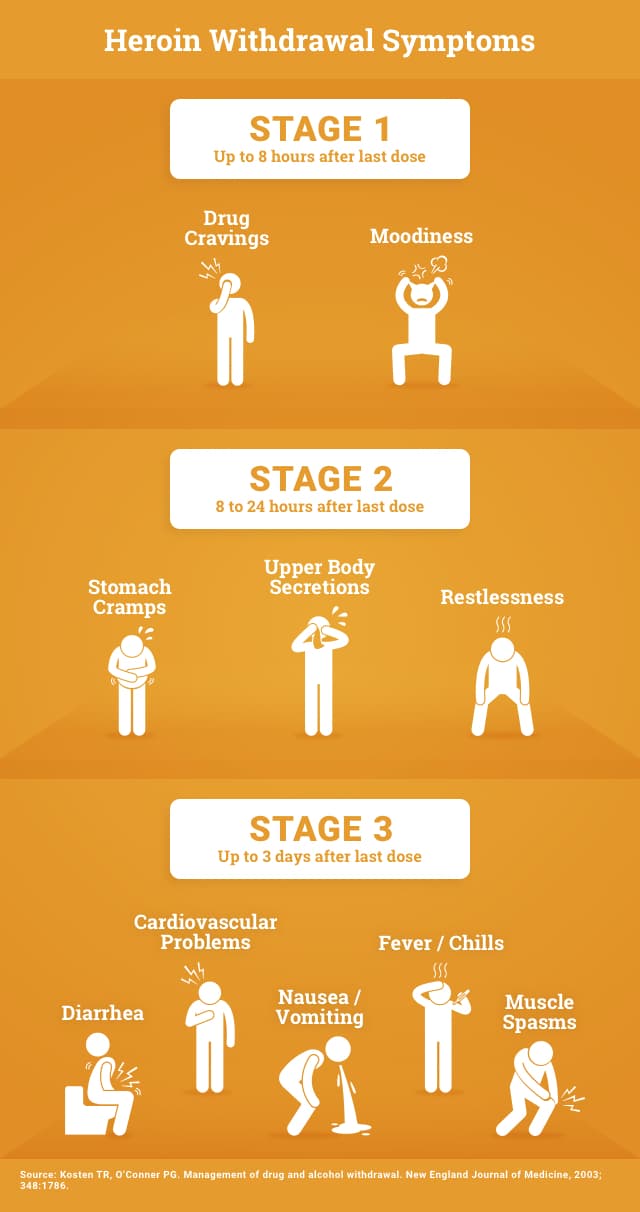
Understanding the Heroin User in Your Life
If you have a child, parent, spouse, or other family member or friend who is addicted to heroin, you may wonder what you can do to help them. You may feel isolated, helpless, and powerless. But it’s better to confront the problem than let it continue.
You can start by having a conversation with them. If that doesn’t work, you can try an intervention. Set boundaries and don’t enable their behavior. Once the person leaves rehab, they will need help adjusting to life without drugs.
Family members dealing with addiction also need to take care of themselves. Get enough sleep, eat well, do activities you enjoy, and attend support groups.
How Do I Know If My Loved One Is Addicted?
There are a few different ways that can help you detect whether or not your loved one may be using heroin.
Signs and Symptoms of Heroin Addiction
Addiction refers to the compulsive use of heroin or other drugs despite negative consequences.1 Signs of heroin addiction can include problems with relationships, work, finances, emotional regulation, physical health/appearance, and behavior.
More specifically, the signs can include:
Physical
- Drowsiness.
- Itchy skin; scratching.
- Slurred speech.
- Persistently tiny or constricted pupils.
- Euphoria followed by apathy and depression.
- Impaired memory or attention.2,3
Behavioral
- Neglect of work, school or home responsibilities.
- Less participation in previously enjoyed social or recreational activities.
- Neglecting personal hygiene.
- Engaging in crime and experiencing legal problems.
- Unexplainable financial problems, including constantly borrowing money.
- Spending time with a new group of friends.
- The cessation of once pleasurable activities to make more time for drug use.
- Abrupt changes in mood.
- A change in personality, including an increase in irritability and anxiety.
- Acting deceptively as if trying to hide something or keep something a secret.2,3
Withdrawal Symptoms
People who are addicted to heroin are often dependent on the drug, which means they experience withdrawal symptoms when they stop using it or cut down on their use.
If your loved one is using heroin, they may also show withdrawal signs such as depression, runny nose, sweating, muscle aches, fever, vomiting, and insomnia.3 Learn more about the top 10 heroin withdrawal symptoms below.
Method of Heroin Use
Finally, one’s method of heroin use can also indicate signs of possible addiction.
Signs of intravenous users:
- Track marks.
- Collapsed veins.
- Bacterial infections/skin wounds/abscesses.
- Contraction of HIV or hepatitis
- Tuberculosis.3
Signs of intranasal users:
- Perforation of the nasal septum.
- Irritation of the nasal mucosa.3
If your loved one presents with any number of these signs or symptoms, they may be suffering from an addiction to heroin.
Why Can’t My Loved One Stop Using?
Most people who become addicted have a hard time quitting on their own. The use of heroin and many other addictive drugs is associated with an increase in dopamine activity. Dopamine is a neurotransmitter, or chemical messenger, instrumental in the operation of our brain’s reward system. Its release normally reinforces natural behaviors such as sex and eating.1
The massive amounts of dopamine released when heroin is used can result in an overwhelming need to continue drug use, often to the exclusion of other activities. Over time, repeated use affects areas of the brain related to judgment, decision-making, learning, memory, and self-control. So while the initial decision to use is voluntary, it can become harder for a person to stop the longer they use.1
If you suspect that your loved one has an addiction, don’t wait to address it. Research has shown that early identification of addiction is more effective than waiting until it has crippled a person’s life. The person is more likely to be able to do the work to get clean, and treatment is likely to be less disruptive and anxiety provoking. Early intervention can also help prevent the devastating potential consequences of addiction like arrests, health problems, and death.4
Research has revealed that nearly 90% of individuals suffering from a substance addiction live with a significant other or at home with family. Oftentimes, these family members suffer from depression and anxiety as a result of the user’s negative and harmful behaviors.2
How Should I Talk to the Heroin User in My Life?
Discussing your concerns with your child, spouse, parent, sibling, or friend can seem daunting. A crucial point is to not confront them from a place of judgment or blame but from a place of compassion and concern. Your goal is to understand each other’s perspectives by engaging in a healthy discussion in which you both listen and both have a chance to speak.4
Before you speak to your family member, it may be a good idea to identify some treatment programs. If the person wants to get help, you need to be able to act as quickly as possible to get them into treatment. Learn about the different types of programs and what you can expect from them.
There are a variety of treatment programs available that can be tailored to fit your loved one’s specific needs. For example, for teenagers, treatment programs may target age-specific challenges such as body image, bullying, peer pressure, and self-esteem. They also recognize the important role school plays in your child’s life and may allow them to do schoolwork while in treatment.
How to Talk to Them
Below are some communication tips to keep in mind. These methods have been found to be most helpful when talking to someone using drugs and are encouraged:
- Try to talk to them when they’re already trying to kick the habit. This means that they have already acknowledged that there’s a problem and have the desire to Often, this one simple acknowledgement is half the battle.
- Communicate in a gentle, nonjudgmental, and empathetic way. Be kind and show genuine concern and care for them. Chances are, they will respond more positively.
- Consistently remind yourself of the person’s positive qualities. This will help you to keep things in perspective when trying to get your loved one help.
- If you receive a positive response, you may suggest counseling or rehabilitation. If the interaction goes well, your loved one or friend may open up more to discussions about therapy or other recovery options.
CRAFT encourages family members to stop making excuses for your loved one who uses heroin. Avoid lying for him or her about intoxication or behaviors.
It was once believed that confrontation was the best way to approach a loved one suffering from an addiction – but current research asserts that this strategy may be counterproductive when encouraging the user to enter a rehabilitation program.2
How NOT to Talk to Them
These tips can help you avoid a counterproductive interaction with your loved one:
- Don’t talk down to them or degrade them. Heroin users tend to feel a lot of shame associated with their drug use. When approaching them, the last thing you want to do is judge them. It’s not productive and will further perpetuate the shame and guilt they feel.
- Avoid a heart-to-heart talk when the user is under the influence or sick. They will not be able to carry on a coherent conversation and may not remember what was said. It’s better to wait until a sober moment that allows for openness to discussion.
- Avoid negative or angry confrontation. This will often cause the user to become combative and defensive, rather than receptive. They may leave the house rather than listen to you.
- Avoid blaming the person for their heroin addiction. Instead, approach the problem from a collaborative and encouraging angle, which will empower both you and your loved one.
If the person denies that there’s a problem, see if they’d be willing to talk again. The person may not be aware of the problem, and this may be the first time they’ve thought about it. They may need time to process the conversation.
What To Do If They Don’t Want Help
If your family member doesn’t want help or doesn’t think they need help, set personal limits or boundaries. Boundaries are guidelines that help limit the effect of a user’s behavior on the family members. They help keep the family safe physically and emotionally.5
According to Adfam, a British organization that supports families affected by drug or alcohol abuse, setting a boundary involves:5
- Defining the boundary—figure out which issue you want to deal with, what you want to achieve, and what the consequences will be if the boundary is broken.
- Putting the boundary in place—have an effective dialogue with the user, ask for what you want, and make a clear agreement.
- Keeping the boundary—notice if the boundary is kept, acknowledge when it’s broken, and respond when it is broken.
When you set consequences for violating a boundary, make sure they are consequences you can follow through on. If the person breaks the boundary, respond immediately and assertively. Be consistent, state how you feel, and don’t be deterred. However, try not to react from a place of anger or frustration.5
Be prepared to have the boundary broken and to have the user challenge you. Many drug users try to push family members back to their previous behavior, especially if the family member was lenient. They may believe that if they are persistent enough, the family member will allow them to continue to get away with what they were doing.5
You will also make sure you are not enabling their addiction. Enabling is protecting the user from the consequences of their actions or hiding the user’s problems from others. It can lead to medical and financial problems, family conflict, and incarceration. The person may not face the addiction until it’s too late.6
Behaviors that enable addiction and should be avoided include:
- Bailing the person out of jail.
- Giving them money.
- Calling in sick for them.
- Letting them live with you while they are still using drugs or alcohol.
- Paying their bills.
- Allowing them to use your car to get drugs or alcohol.
If the person is resistant to treatment, you may want to identify someone else that can have a conversation with them. People sometimes receive information differently when it comes from someone with a different perspective. For example, people may be more inclined to heed advice from a doctor or medical professional than from friends or relatives.7
Doing an Intervention
If they still refuse treatment, an intervention may be helpful. An intervention is a face-to-face meeting between the heroin user and their family, friends, and co-workers. The goal is to get the person to accept that they have a problem and seek treatment.8
Interventions can be professionally led or led by a member of the person’s family. Having an addiction professional lead the intervention may be desirable, especially if your loved one struggles with anger or violence, has serious mental health issues, or has recently made suicidal statements or exhibited suicidal behaviors. 8
There are pros and cons to conducting an intervention. According to the National Council on Alcoholism and Drug Dependence, more than 90% of people agree to get help when an intervention is led by a professional.8
Interventions aren’t guaranteed to work; in some instances, an intervention may backfire, resulting in arguments and even violence. This may be more likely if the interventional style is confrontational.7
No matter what route you choose, keep yourself and your other loved ones safe. Call the police if the situation starts to escalate and you fear for your safety or the safety of others.
If your loved one refuses to get help, you may need to cut off communication and other forms of support. It is important to remember that this decision is one that supports your loved one’s health and recovery and is done after other efforts to help them have failed.
Let’s verify your coverage for treatment at an American Addiction Centers location. Your information is always confidential.
Who Can I Talk To?
If your loved one is addicted to heroin, there are many resources available to support you so you can adequately provide help for the user in your life. These groups specialize in treating friends and family members of addicted individuals. Support groups include:
- Nar-Anon Family Groups—a 12-step program for families and friends of people with drug addictions
- SMART Recovery Family and Friends—a secular support group for families affected by drug or alcohol abuse, with in-person and online meetings
- Co-Dependents Anonymous—another 12-step program for people who want to develop healthier relationships
- Families Anonymous—a 12-step program for families and friends of addicts
Don’t be afraid to reach out for help. Living with someone addicted to heroin can put stress on your life and can be extremely trying. You can’t help your loved one if you don’t focus on your own self-care as well. It’s critical for your mental health and for your loved one’s recovery.
Other things you can do include:
- Engaging in positive activities such as hanging out with friends, cooking, journaling, and making time for at least one positive activity each day.
- Tending to your physical health by eating well, drinking plenty of water, getting enough sleep, avoiding alcohol and drugs, and exercising.
- Seeing a therapist, which allows you to safely talk about how addiction has affected you and your family.
You don’t necessarily have to do all of these things. Just pick the ones that you’re comfortable with. It doesn’t matter how often you do something, just that you make time for it. Doing something you enjoy for as little as a few minutes a day can help you step away from your responsibilities and stress and reconnect with yourself.
Supporting Them Post-Rehab
Treatment will help your loved one learn about their addiction and give them tools to manage it. But it doesn’t “cure” the addiction. It’s a condition that has to be managed long term.
Recovery continues when your loved one leaves treatment and begins to navigate life without the use of drugs or alcohol. Their treatment program may help them plan for an aftercare program that could consist of individual and family behavioral therapy, support groups, 12-step meetings, and sober living.
You can support them by:
- Allowing them to live with you if they are in a recovery program.
- Attending therapy with them.
- Providing transportation to healthy activities such as going to work, therapy, meetings, and support groups.
- Discussing any red flags or signs of drug use.
- Assisting with childcare so they can focus on recovery.
- Celebrating milestones in their recovery through praise or other healthy incentives.
Engage in healthy, positive experiences with them. Sharing pleasant activities is a way to generate more positive feelings that can not only strengthen your relationship but also strengthen their recovery. According to Marsha Linehan, a psychologist and the creator of dialectical behavior therapy, doing one pleasant activity a day can gradually improve a person’s quality of life and mood over time.9
Unfortunately, relapse is a common occurrence in recovery. With heroin, it carries significant risk. Overdose and death can occur, especially if their tolerance to the drug significantly decreases during a period of abstinence.10
However, relapse should not be taken as a signal for failure. Relapse could just be an indication that your loved one’s recovery plan needs to be strengthened or modified.10 They should speak with their sponsor, therapist, or doctor to see what modifications can be made to their treatment plan to reduce the risk in the future. They may need to complete several treatment programs before they achieve long-term sobriety.
If your family member or friend has a problem with heroin, don’t wait. If left untreated, addiction can get progressively worse. Contact your doctor or an addiction professional to identify available treatment options. While recovery can be a challenging process, it is possible and the first step is getting professional help.
Sources
- National Institute on Drug Abuse. (2018). The science of drug use and addiction: The basics.
- S. Indian Health Service. (n.d.). Warning signs of drug abuse and addiction.
- Diagnostic and statistical manual of mental disorders: DSM-5. (5th ed.). (2013). Washington, D.C.: American Psychiatric Association.
- Partnership for Drug Free-Free Kids. (2014). Helping an adult family member or friend with a drug or alcohol addiction.
- (2010). Setting and Keeping Boundaries.
- Washington State Employee Assistance Program (EAP). (2016). Codependency and Addiction.
- National Institute on Drug Abuse. (2016). What to do if your adult friend or loved one has a problem with drugs.
- National Council on Alcoholism and Drug Dependence. (2015). Intervention- Tips and Guidelines.
- Linehan, M. (2015). DBT skills training manual. New York, NY: The Guilford Press.
- National Institute on Drug Abuse. (2018). Drugs, brains and behavior: The science of addiction.
Heroin Rehabilitation Directory
Select a state to learn more about your treatment options.- Alabama
- Alaska
- Arizona
- Arkansas
- California
- Colorado
- Connecticut
- Delaware
- District Of Columbia
- Florida
- Georgia
- Hawaii
- Idaho
- Illinois
- Indiana
- Iowa
- Kansas
- Kentucky
- Louisiana
- Maine
- Maryland
- Massachusetts
- Michigan
- Minnesota
- Mississippi
- Missouri
- Montana
- Nebraska
- Nevada
- New Hampshire
- New Jersey
- New Mexico
- New York
- North Carolina
- North Dakota
- Ohio
- Oklahoma
- Oregon
- Pennsylvania
- Rhode Island
- South Carolina
- South Dakota
- Tennessee
- Texas
- Utah
- Vermont
- Virginia
- Washington
- West Virginia
- Wisconsin
- Wyoming
Help for Heroin Addiction
Do you know someone suffering from heroin addiction? Help is available. To find out more, please choose the selection that applies to you or the person suffering from addiction:
Fill out the form below to be contacted.
Repair the damage and start fresh today!



